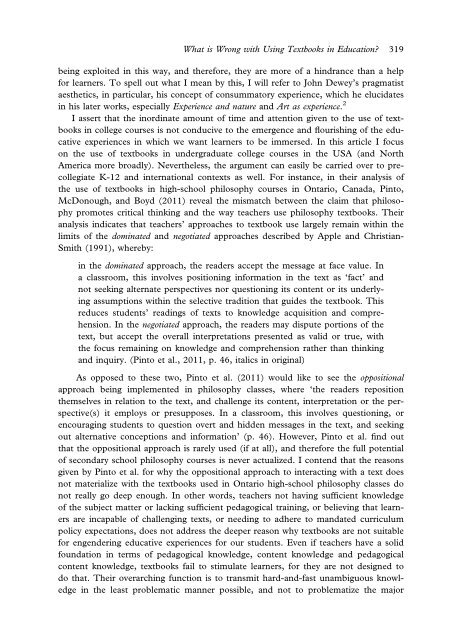Oral 2013 TextBooks
Create successful ePaper yourself
Turn your PDF publications into a flip-book with our unique Google optimized e-Paper software.
What is Wrong with Using Textbooks in Education? 319<br />
being exploited in this way, and therefore, they are more of a hindrance than a help<br />
for learners. To spell out what I mean by this, I will refer to John Dewey’s pragmatist<br />
aesthetics, in particular, his concept of consummatory experience, which he elucidates<br />
in his later works, especially Experience and nature and Art as experience. 2<br />
I assert that the inordinate amount of time and attention given to the use of textbooks<br />
in college courses is not conducive to the emergence and flourishing of the educative<br />
experiences in which we want learners to be immersed. In this article I focus<br />
on the use of textbooks in undergraduate college courses in the USA (and North<br />
America more broadly). Nevertheless, the argument can easily be carried over to precollegiate<br />
K-12 and international contexts as well. For instance, in their analysis of<br />
the use of textbooks in high-school philosophy courses in Ontario, Canada, Pinto,<br />
McDonough, and Boyd (2011) reveal the mismatch between the claim that philosophy<br />
promotes critical thinking and the way teachers use philosophy textbooks. Their<br />
analysis indicates that teachers’ approaches to textbook use largely remain within the<br />
limits of the dominated and negotiated approaches described by Apple and Christian-<br />
Smith (1991), whereby:<br />
in the dominated approach, the readers accept the message at face value. In<br />
a classroom, this involves positioning information in the text as ‘fact’ and<br />
not seeking alternate perspectives nor questioning its content or its underlying<br />
assumptions within the selective tradition that guides the textbook. This<br />
reduces students’ readings of texts to knowledge acquisition and comprehension.<br />
In the negotiated approach, the readers may dispute portions of the<br />
text, but accept the overall interpretations presented as valid or true, with<br />
the focus remaining on knowledge and comprehension rather than thinking<br />
and inquiry. (Pinto et al., 2011, p. 46, italics in original)<br />
As opposed to these two, Pinto et al. (2011) would like to see the oppositional<br />
approach being implemented in philosophy classes, where ‘the readers reposition<br />
themselves in relation to the text, and challenge its content, interpretation or the perspective(s)<br />
it employs or presupposes. In a classroom, this involves questioning, or<br />
encouraging students to question overt and hidden messages in the text, and seeking<br />
out alternative conceptions and information’ (p. 46). However, Pinto et al. find out<br />
that the oppositional approach is rarely used (if at all), and therefore the full potential<br />
of secondary school philosophy courses is never actualized. I contend that the reasons<br />
given by Pinto et al. for why the oppositional approach to interacting with a text does<br />
not materialize with the textbooks used in Ontario high-school philosophy classes do<br />
not really go deep enough. In other words, teachers not having sufficient knowledge<br />
of the subject matter or lacking sufficient pedagogical training, or believing that learners<br />
are incapable of challenging texts, or needing to adhere to mandated curriculum<br />
policy expectations, does not address the deeper reason why textbooks are not suitable<br />
for engendering educative experiences for our students. Even if teachers have a solid<br />
foundation in terms of pedagogical knowledge, content knowledge and pedagogical<br />
content knowledge, textbooks fail to stimulate learners, for they are not designed to<br />
do that. Their overarching function is to transmit hard-and-fast unambiguous knowledge<br />
in the least problematic manner possible, and not to problematize the major


